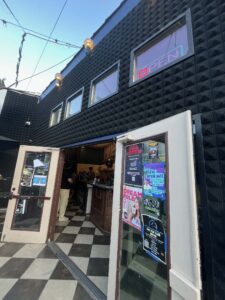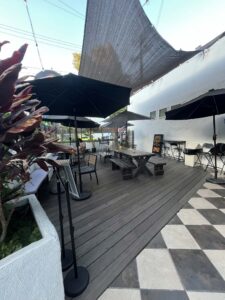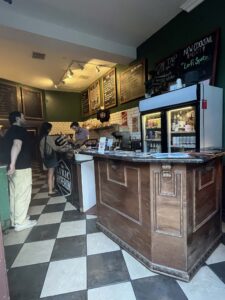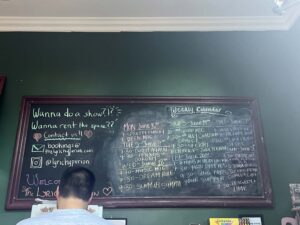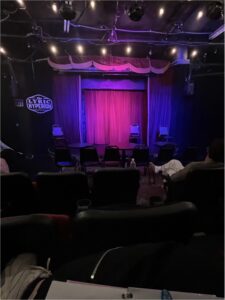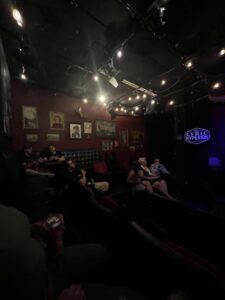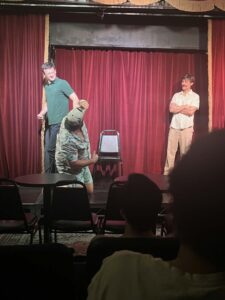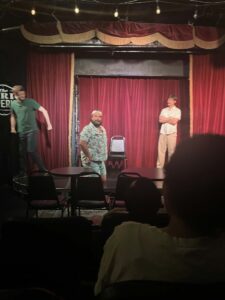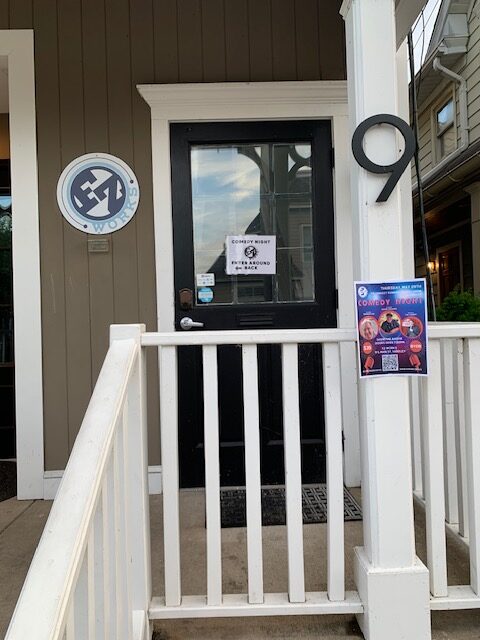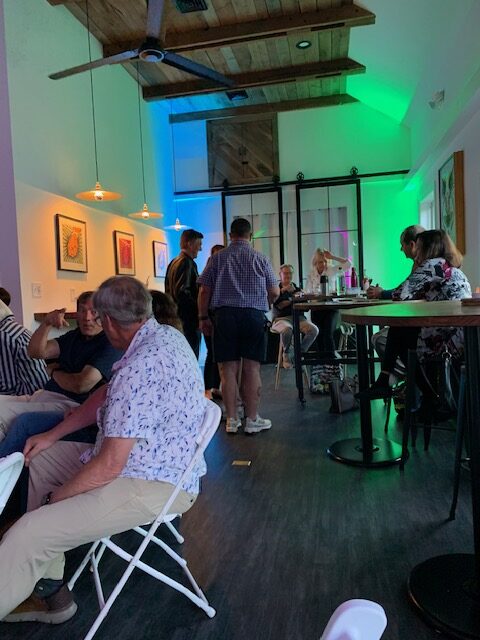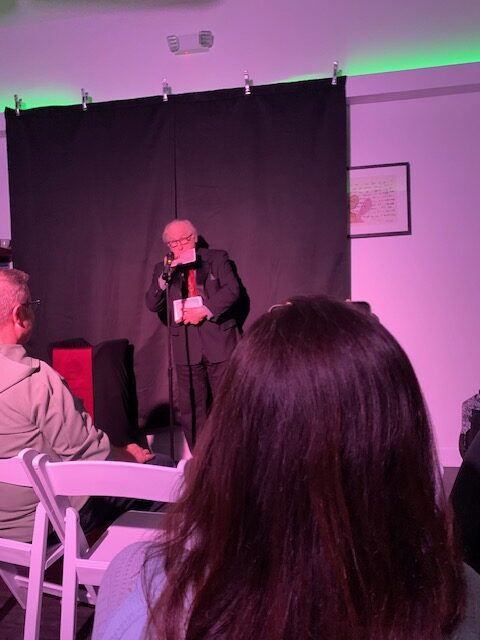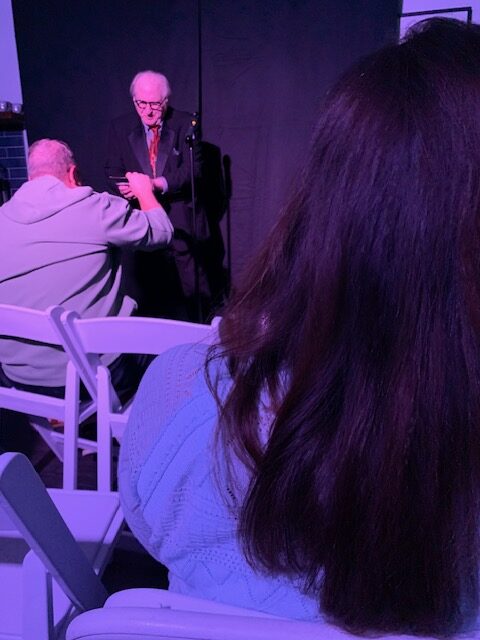Comedy Scenes in a Fragmented America
A sense of fragmented reality has churned up intense emotions in public and private spaces across America. In this heated climate, where it seems hard to find humor, who’s going out to see comedy in their community? How are comedians performing in different places?
At the American Communities Project, we sought to understand what live comedy feels and sounds like in America, how comedians are tackling hot-button cultural issues on stage, and how various audiences are responding to their acts.
In our quest, writers around the country chronicled their experiences at comedy shows within or near their home counties, from the west to east coasts. (Click on the anchor links below to jump to specific vignettes.)
Los Angeles County, California (Big City)
Sandoval County, New Mexico (Exurb)
St. Louis County, Missouri (Urban Suburb)
Cook County, Illinois (Big City)
Sarasota County, Florida (Graying America)
Bucks County, Pennsylvania (Exurb)
A show ticket for one, including service fees, ranged in price at the chosen venues — about $12 in Los Angeles, $17 in St. Louis, $26 in Sarasota, $32 in Sandoval, $39 in Bucks, and $52 in Cook County’s Chicago.
Between the cost, content, and availability, attending comedy shows is a definite niche activity. The 2024 MRI-Simmons consumer survey found that 6% of Americans went to a comedy club/stand-up comedy show in the past 12 months. (The survey was conducted between September 2021 and August 2023.) Just 3% attended less than once a month. Attending shows was most popular in urban-oriented and affluent communities where entertainment options abound, particularly in the Big Cities and Exurbs.
Reaching Audiences and Communities Online and In Person
At the same time, there are ways comedy has become more inclusive. Michelle Robinson, associate professor of American Studies at the University of North Carolina-Chapel Hill, who’s taught the course “The Ethics of Stand-up Comedy,” explained by email: “Since the expansion of platforms that offer opportunities for more comedians to make their work available and even deliver hour-long specials has grown, stand-up comedy writ large includes or addresses more people…. Comedians may be more likely to find their audience(s), either by chance or via ‘the algorithm.’ Popular comedians ‘foster’ or ‘mentor’ one another through the production and direction of specials.
“If the [inclusive] question is really about whether popular humor (or trending stand-up comedy) by and large is conscious of diverse sensibilities and identities, it’s hard to say,” Robinson said.
Comedian and producer Jeremy Essig, who’s experienced the ebbs and flows of the comedy business for the past 25 years, knows these trends well. For five years running, Essig’s company Rhizome Art Limited/Rhizome Comedy in Raleigh, North Carolina, has been producing comedy and distributing specials to Amazon, Apple, Netflix, and other outlets. For 20 years previously, he was a touring comic.
“Comedy is in a boom phase right now,” Essig said in a phone interview. “Clubs are a lot fuller. I feel like it’s a very cyclical thing….”
Essig attributes much of this surge to the pandemic and social media, as people were stuck at home and entertaining themselves on YouTube, TikTok, and Instagram. After the lockdowns ended and in-person entertainment got going again, many wanted to come out and meet the comics they were following online.
The fragmentation of American culture means that “people are playing largely to their own audiences,” Essig said. “You can be a Joe Rogan and be very popular, and or a Joe Rogan derivative, but you can also be someone very left and attract a similar audience. And then, what’s interesting in the middle is people that aren’t as well known.” Some of Essig’s performing comedian peers in the middle ground can see a disgusted face and “people on a hair trigger about smaller things,” he said.
So, is it hard to find comedy that kills everywhere now, compared to, say, 20 years ago, or does it depend on the kind of community where a comedian is working?
Robinson weighed in: “I would compare the situation to network TV before the rise of cable, where comedic ‘gatekeeping’ structured how we understood what good comedy was and trained us (and our bodies) to laugh. This is not to say folks lacked discernment then or now, but cacophony is not bad. ‘Community’ divides can be geographical, generational, virtual (by platform), political, and along so many other lines, and comedians now interface with all sorts of ‘communities.’ Geography probably matters as much as we think…but sometimes the comedy itself changes, because the air is freer.”
What did the writers for the ACP find in their communities? Read on.
Los Angeles County, California (Big City)
By Jenna Modica
It’s a time of great hurt in Los Angeles as immigration raids and protests against them continue. Almost like a split screen, the world’s comedy hub is meeting a need for good humor. About 20 minutes from where the Marines and National Guard troops have been stationed since early June, The Lyric Hyperion is one of the venues soldiering on.
On this mid-June Monday night, the 60-seat theater was feeling especially intimate with the small crowd gathered. Various pictures and plants hung around the space, “Harry Potter” and “Star Wars” soundtracks played on a loop, and the smell of fresh popcorn wafted through the air — $6 for endless popcorn. Alcohol sales were plentiful, too.
The 33 attendees reflected some diversity but generally skewed younger. Guests included a group of three white women in their 30s/early-40s, a group of three twentysomething white women, a single early-20s white woman sitting alone, one lesbian couple, three Black men, two females of Indian descent, two males, with the rest mainly white women from their 20s to 50s.
We were there for the long-form improvised show “Pretty Funny,” starring comedy veterans Jon Gabrus of “High and Mighty” and “101 Places To Party Before You Die,” Ben Rodgers of “Workaholics” and “Star Trek: Lower Decks,” and Dom Dierkes of Derrick Comedy and “Solar Opposites.” In the opening (which started 15 minutes late), the three men made gestures suggesting they were having a threesome. Two identified as gay dads. The bit drew a lot of laughter. One single thirtysomething male attendee with a very loud, distinct laugh rocked back and forth laughing most of the act. When the men acted as if they were kissing and enjoying it, the audience smiled, clapped, and laughed out loud.
The audience gravitated to Gabrus in a tropical shirt. Appearing as the biggest personality of the three, he drew big laughs when he did female voice impressions.
When the comedians asked for an audience member’s favorite song lyric, a 20s Black, curly-haired woman shouted, “Tell me something good.” Responding to the prompt, the men set the scene in 2001, with one man playing an old computer and the other two shouting out descriptions to us in the audience. The group memorably addressed the tragic September 11th terror attacks with a joke on how an old computer would have operated during that time. With pitch-perfect humorous words and moves, the men did not offend but engaged through the whole show.
Afterward, I asked Kassandra Galindo for her thoughts. Galindo was striking with tan skin, fresh tattoos, dark hair and eyes, and a welcoming smile. She attended alone from the Inland Empire area, east of LA. The 32-year-old social media coordinator used to work at a comedy club, but this was her first improv show. She desired a more intimate setting and is trying new things in L.A. “The crowd work was fun and cool to see them incorporate it in their act. I like how their gay jokes weren’t inappropriate but rather tasteful.”
Galindo laughed a lot in the first half, but not as much in the second half. Being given too much detail and getting lost in the story made her lose energy, she said. She wasn’t a fan of the late start but will return to Lyric Hyperion, having enjoyed the bar, stage, and overall setting. “Since this was my first time, I was nervous to raise my hand to give a lyric or introduce myself. But now I know what to expect and will be the first hand up next time.”
Sandoval County, New Mexico (Exurb)

By Sarah Murphy
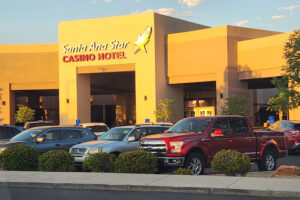
As I drove north along I-25, the cityscape faded into sagebrush while the Sandia Mountains dominated the eastern horizon. My destination this early June Saturday night: Quezada’s Comedy Club & Cantina inside the Santa Ana Star Casino Hotel in Bernalillo, New Mexico, about 25 minutes from downtown Albuquerque. Upon arrival, I navigated past the floor of slot machines to find the comedy club tucked along an interior wall. Quezada’s, which opened in 2023, is one of a small handful of local comedy clubs, nearly all of which have opened in the past seven years.
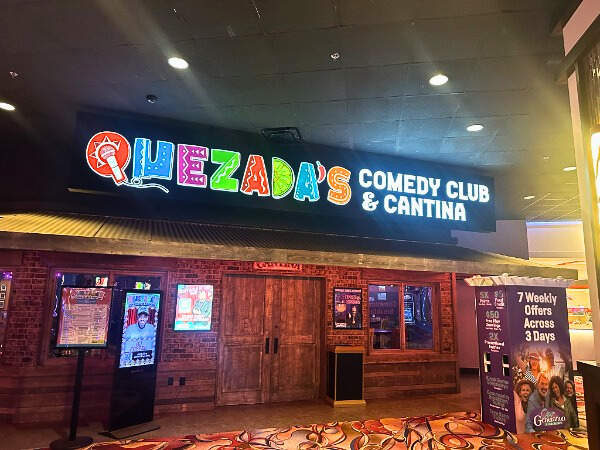
Headlining was Leo Gonzalez, TikTok-star-turned-Hulu-actor of “This Fool,” whose stand-up career began just three months ago. The cantina bartender said the sold-out show was rare, but he attributed the impressive turnout to Gonzalez’s popularity among New Mexicans. Big-name comedians tend to overlook Albuquerque for places like Dallas or Phoenix, but recent club headliners including Margaret Cho, Tom Arnold, and Gonzalez may be a sign of change.
Inside the club, theatrical lights adorned the walls of the intimate and lively 300-seat room. Casually dressed friends and couples in their late 30s to 40s enjoyed drinks and snacks with a warm din. I was seated with the Martinez family — Danny, Jessica, and their son Danny Jr., who lives in Albuquerque and invited his parents out from Mora, New Mexico. The couple moved there 20 years ago, though Jessica’s Padres jersey and Danny’s cheering at the mention of East L.A. pointed to their Southern California roots. Jessica said she discovered Gonzalez’s TikTok videos during the pandemic. They’ve been a bright light for her, a nurse practitioner, and she appreciates that his humor is relatable and not too raunchy.
The audience welcomed Martin Rizo’s and Isaac Castro’s opening sets. Given Gonzalez’s reputation for clean humor, a few graphic jokes drew polite groans from the crowd, but pop culture riffs like Destiny’s Cholas and Brokeback Montaño landed solidly. Once Gonzalez took the stage, his endearing charm shined while taking a birthday tequila shot with a fan, posing for a mid-set photo-op, and celebrating two recent graduates in the audience — Jessica included. A line about Gonzalez’s recent breakup drew some playful flirty banter from a woman in the front row. In a twist of comedic irony nearly two-thirds through the set, the revelation that the woman is married earned the audience’s chagrin and the biggest laughs of the night.
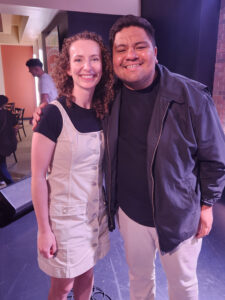
In an interview with Gonzalez afterward, he acknowledged that navigating hot-button issues is tough. Recent protests and ICE deportations in L.A. hit home for him, but he’s not always sure how to address these topics with an audience whose political leanings feel opaque. During his set, Gonzalez tested the waters with the tentative: “Did you guys have a pandemic here?” but revealed that the crowd was still hard for him to read. Given the moderate leaning of Sandoval County and the diverse communities of the surrounding area, that’s understandable. Because he believes good comedy comes from being a good observer and making the crowd feel seen and understood, he doesn’t want to risk missing that mark: “Sometimes I try to be nonpolitical, and just land on being a decent person as the common ground,” he admitted.
Jessica was first in line for a photo-op with Gonzalez. Her highlight of the night? “How he can make people like me laugh,” she gushed.
The crowd’s mid-set cheers of “We love you, Leo!” were testament to their shared sentiment and Gonzalez’s ability to unite a diverse audience, regardless of their politics. More than punchlines, Gonzalez offered genuine connection and gratitude to the crowd who came to see him and feel seen by him: “I’m so glad you’re here,” he said more than once, and you could tell he meant it.
Danny Jr. was all smiles and hoped that Gonzalez’s show was a sign that Albuquerque’s comedy scene is heating up. The crowd here proved there’s a warm, receptive community ready to welcome touring comedians and eager to celebrate the bridge-building power of comedy.
St. Louis County, Missouri (Urban Suburb)
By Jenna Fisher
Some came on dates, others with coworkers. One table of girls erupted in cheers when the high school teacher on stage called them out. “I didn’t recognize you,” he quipped. “You’re on time.”
The crowd roared.
It wasn’t quite a full house this mid-June Friday night at the St. Louis Funny Bone, but the audience of more than 100 came ready to laugh, even if it meant being nudged a little. Ages ranged from teens to people with gray hair. The average attendee was around 50 years old. Audience members were mostly white, middle class, dressed more casually than not, and quick to respond to the entertainers. Some bits got belly laughs. Others landed more softly, with a ripple of chuckles and nods. While there might have been some squirming from the younger crowd, no one booed. No one walked out. Everyone seemed to be looking up and engaged.
“I was nervous,” admitted Brenda Varnum, 54, who drove nearly an hour from New Baden, Illinois, for a date. A licensed home childcare worker offering daycare programs in New Baden, Varnum used to attend more live comedy before Covid. This was her first show post-Covid. “I thought it might get too liberal. But I didn’t feel uncomfortable at all…. I thought it was hilarious. My cheeks are stuck,” she added, reaching up to her face to emphasize how much she’d been smiling.
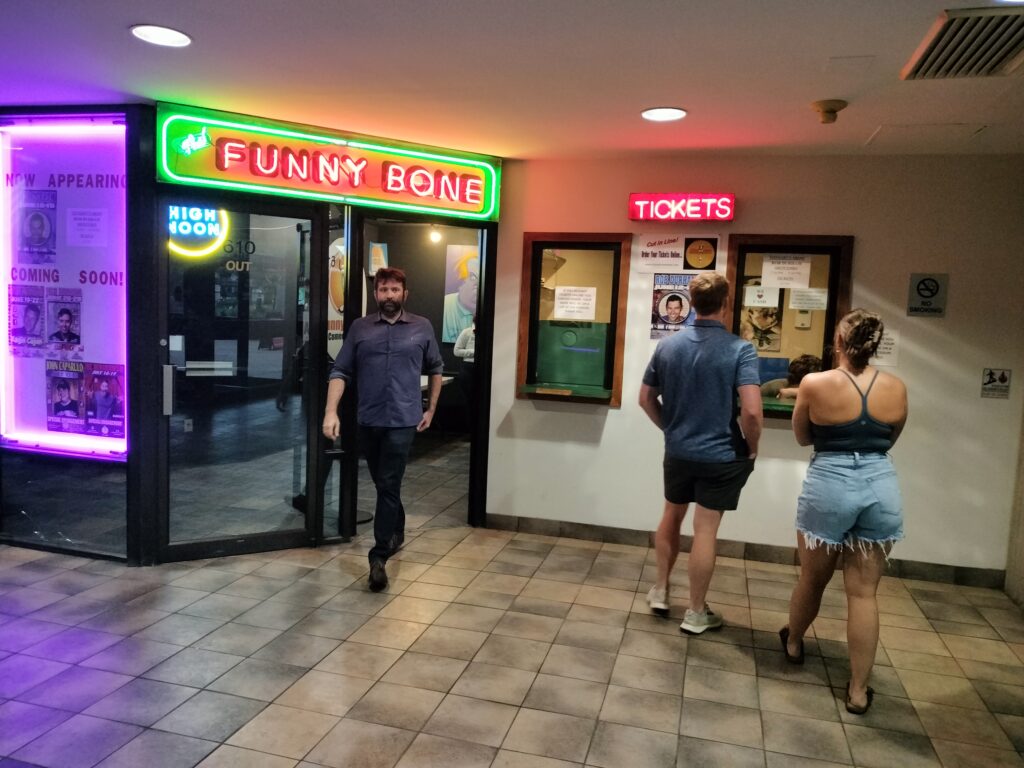
Tucked into a St. Louis County mall, the club could have been pulled from a comedy movie set: tightly packed two-person tables with four people tucked into them sipping drinks, as waitresses flit between sets. A single stool and microphone sat on stage in front of a brick wall with the club’s neon logo. Around the corner, by the restrooms and the bar, a karaoke room. If there had been a haze of cigarette smoke in the air, it would’ve completed the scene in the low-lit room.
Three comics performed, each with a distinct style. Host Tim Convy opened with casual banter, noting he avoided political material just before delivering a joke that had the crowd holding its breath, then exhaling in laughter as he ended his long mock political advertisement making absurd promises with, “Vote for me for state treasurer.” Joe Stapleton followed, a poker commentator with high energy and rapid delivery and a tendency to deliver his jokes at a near yell. His set jumped from crude humor to abortion to beer. Some jokes landed well, others drew nervous laughter, especially from a table of college men and the table of high school girls.
Headliner Rob Durham took the stage with the ease and practice of someone who has experience in front of tough crowds (read: high school students). And he leaned into his life as a high school teacher. He joked about Gen Z slang, anxiety, and getting called into the principal’s office to the constant cackle of the nodding audience.
Each comic approached cultural flashpoints without dwelling. Durham came closest to pushing deeper, with whip-like commentary on banned books, the idea of arming teachers, and then more seriously stepped onto a proverbial soapbox to talk about all the things teachers don’t get paid to do, like play chess with the student who doesn’t have friends, and stay after school to support the kid who said he doesn’t want to live anymore. As he took a breath to end his vent, the room was silent. Still, the crowd stayed with him. And that’s when he delivered his punchline, “Nah, I don’t do any of that,” that sent belly laughs throughout the crowd. He later confirmed he does, do that stuff, to more laughs.
Sara Phillips de Borja, of Ballwin, Missouri, is a big comedy-goer and has been in rooms where the comedian did not read the room and completely tanked. From her perspective, these guys did great, and she loved how they were able to localize their jokes, poking fun of different suburban neighborhoods. She felt a little uneasy over a brief comment about East St. Louis, a predominantly Black area of downtown that gets a bad rap and can be a dog whistle for racism, but otherwise she really loved Durham’s observational comedy.
On the way out, as the lights came up and the staff swept in to prep for the next show, several pointed to Durham’s school material as a highlight, including Iowa couple Nate and Tawny, in town for their teen’s soccer tournament.
For them, the evening was about release. The two love comedy, specifically Nate Bargatze, and thought the teen stuff killed. “We just came in to let go and laugh,” Tawny said.
“Nothing should be off the table,” Nate added.
The audience seemed to agree.
Cook County, Illinois (Big City)
By Jake Pinkus
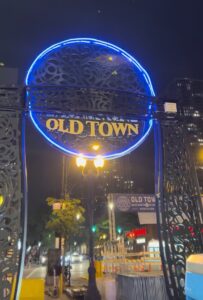
It wasn’t just any June Friday night in Chicago’s Old Town neighborhood. It was the night before the Old Town Art Festival, which started in 1948 and has become one of America’s foremost juried art fairs. While the neighborhood prepared for the big event — featuring 230 artists and 57 garden stops — I walked around streets I frequented years ago. Little had changed. As I stepped onto North Wells Street, I spotted the familiar red awning of The Second City, the flagship comedy venue.
I came here to see the latest Mainstage revue, “This Too Shall Slap.” As I entered, the air buzzed with chatter and the clinking of glasses. Waiters navigated the crowd, taking food and drink orders, adding to the dinner-theater atmosphere.
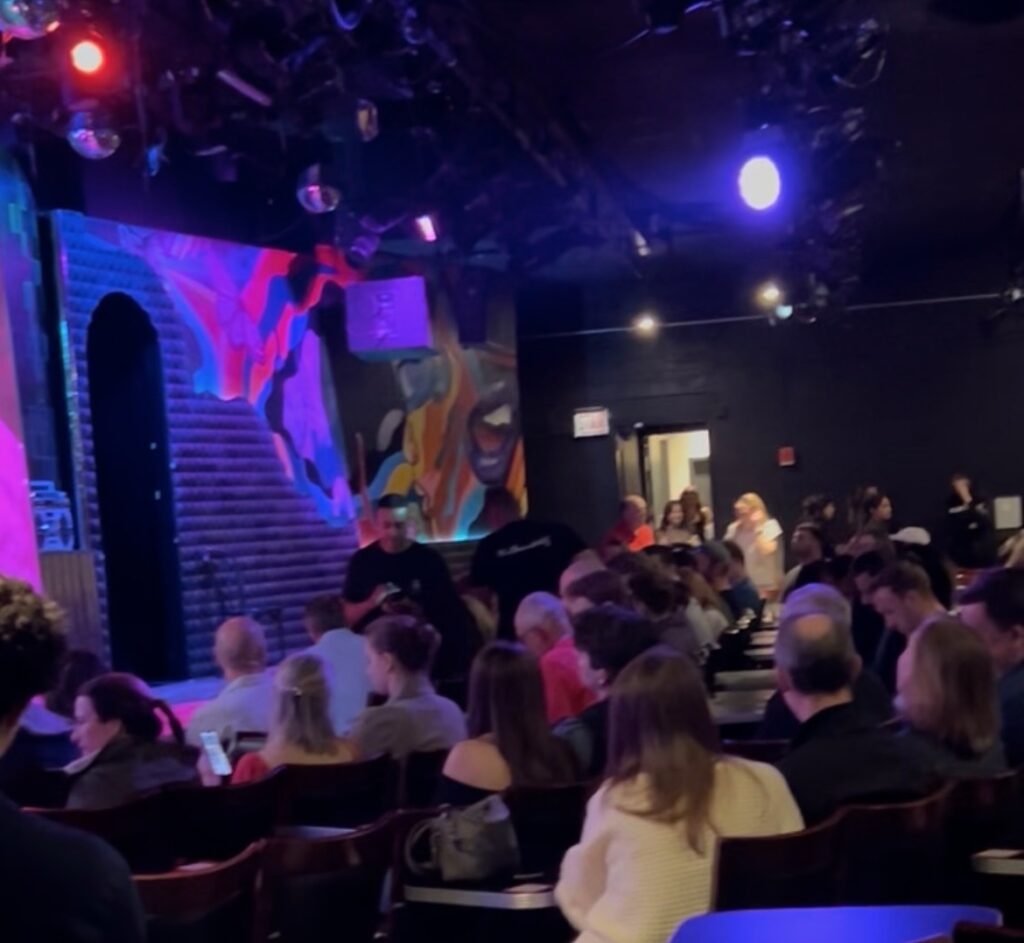
The room accommodating about 300 seats was full, and the audience was diverse. A few tables away sat a married couple in their late 50s from Naperville, Illinois, part of Chicago’s western suburbs. They came for a date night. “We love comedy!” Susan shared. “This is our fifth time coming to Second City. We’ve tried other comedy clubs in the area, but nothing ever compares.” Her husband, Greg, nodded in agreement. “We’ve gone to Zanies right around the corner, but didn’t like the vibe.”
Nearby, a gay bachelor party group of 15 filled a large table, their laughs mixing with hoots and cheers. Across the aisle, six friends were celebrating a college birthday party.
On stage, the diverse six-person ensemble — Leila Gorstein, Adonis Holmes, Hannah Ingle, Bill Letz, Jordan Stafford, and Adisa “Di” Williams — displayed obvious chemistry and skill, with seamless transitions between characters and sketches.
“Musical Chairs,” set in an anger management class, began as a simple game before spiraling into hilarious chaos. Physical comedy was only part of its appeal; the sketch explored psychological issues like the pressure to conform, the release of bottled-up emotions, and the need for validation within a group. The audience, including the bachelor party and couple from Naperville, roared.
In “Claudine’s Kitchen,” a parody of trending cooking shows, Claudine maintained a sugary sweet demeanor for the camera, only for her true unhinged personality to emerge during the commercial breaks. The sketch captured how performative public personas are and the fragile sanity underneath. It hit the mark for the audience.
The “Dictator Nation” musical number showcased the most direct nod to political power. But it satirized the concepts of authoritarianism, groupthink, and control, and did not mock current global leaders or specific governmental structures. The audience was laughing and clapping along through the act.
Ensemble member Stafford delivered a standout performance as an elderly character struggling to reach his sister on her birthday, repeatedly dialing the wrong number. The bizarre and awkward conversations with strangers on the other end of the line were both tender and funny, playing up the modern disconnects and the unexpected human connections that can arise from technological mishaps.
In a world that often feels overwhelming and insane, “This Too Shall Slap” reminded me that sometimes the most profound way to understand reality is to laugh at its absurdity.
As for Susan and Greg, the married couple from Naperville, they’re already planning their sixth trip back to Second City.
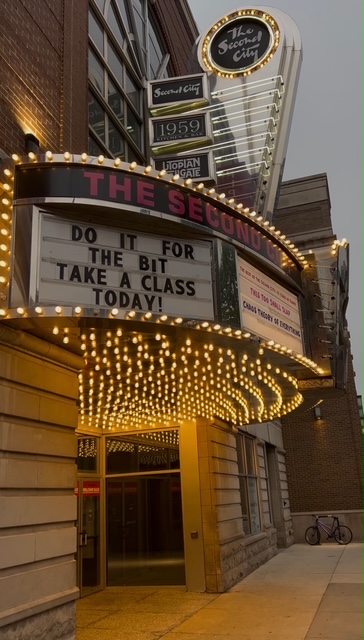
Sarasota County, Florida (Graying America)
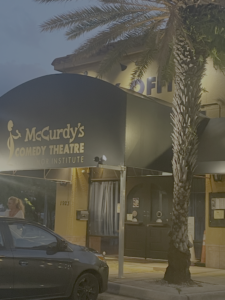
By Kathleen Majorsky
McCurdy’s Comedy Theatre is an institution in Sarasota, Florida. Established in 1988, it moved to the heart of downtown Sarasota in 2014. This small venue draws locals and visitors for comedians’ laughs, bar food, and cocktails most nights, including Sundays.
High season is over in Sarasota. Most snowbirds have flown back north to escape the heat, humidity, and hurricane season that lasts from June through November. But on this first of June, plenty of Sarasota’s seniors were in tow, including at least 20 couples over 55 enjoying cocktails and time with friends before the performance.
Drew Warren, the MC in his late 50s, warmed up the crowd with a few regional jokes — and some generational ribbing. At one point, Warren picked out an 18-year-old from the crowd and joked that he probably isn’t on Facebook anymore. After the guy confirmed he’s not, Warren said something like, ahh, yes, Facebook is where the old people hang.
Geno the Garbage Man, a Black comedian and actual garbage man in the Sarasota/Bradenton area took the stage dressed in his highlighter yellow vest that he wears on the job. Pointing to one of the only Black audience members who was sitting up front, he exclaimed, “I’ve been here three nights in a row, and you’re the first Black person I’ve seen!” In humorous style, he shared very relatable tips for anyone who takes out the trash at home.
Wyatt Cote, the 34-year-old headlining comedian, joked about taking care of his aging father. Cote’s recent air travel got the savage treatment for its sky-high costs. He recounted paying $42 for his seat on Spirit Airlines — and $55 to check his bag. So, the next time, he bought two seats: one for his bag and one for him, then used the extra money to buy a $13 bottle of water.
At a show in Little Rock, Arkansas, Cote had a different numbers problem and regaled us with the story. Referencing his low salary with the Little Rock audience, Cote was like, yeah, people make 10/3 times more than me as a comedian. The audience there did not laugh or seem to understand the fraction, he said. Afterward, Cote said an audience member approached him with the point that she got the joke, adding she understood it because she has a college degree. Cote’s response: Uh, 10/3 is fifth-grade math.
At times, Cote’s style was a bit raunchy, leaving the older crowd to laugh hesitantly.
But not everyone was put off by Cote’s humor. Ashley Linton, 36, an office manager at the local Kia dealership and a Sarasota resident who attended the show with her boyfriend, said, “I’m open to all of it. Whatever resonates. I feel like people get uptight. I like the old school comedy, being able to joke about everything. And not being afraid to joke about things.” This was the second time the couple saw Cote perform at McCurdy’s in the last 12 months.
Lindon waxed nostalgic. “We’ve been watching a lot of ‘Seinfeld’ lately. It was the early ’90s, so it was, of course, a lot of stuff that you can’t say now. It’s old-school comedy.”
She hopes “old-school” comedy is making a comeback. “Now we’ve gotten to a point where we can’t joke about stuff. How do we revert? In the ’90s, you could joke, but now it’s like you can’t say anything about anything. Now we are getting back to, let’s have fun again.”
Fun again. We could all use a little more fun…again.
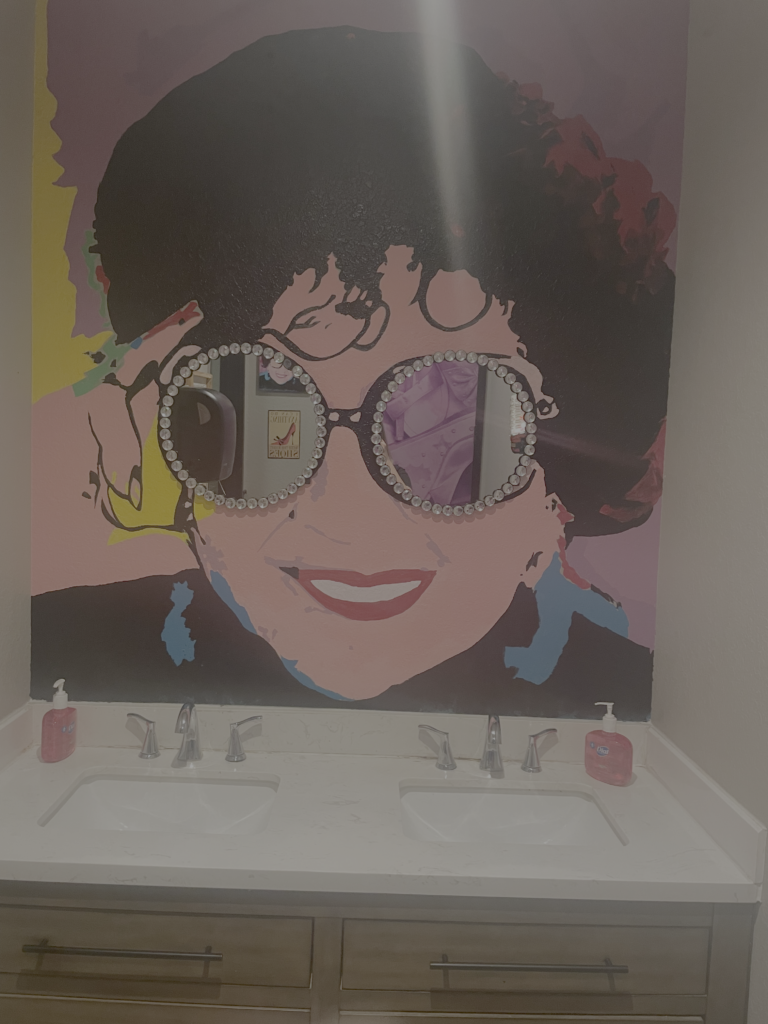
Bucks County, Pennsylvania (Exurb)
By Ari Pinkus
Once a month for nearly two years running, a stylish coworking space one floor up on Yardley’s Main Street, morphs into a comedy showcase with a BYOB bar. On some nights, it’s overflowing. On the cool Thursday night of Memorial Day week, the room was not as full, with 30 attendees that included a mix of couples and singles in casual dress, some coming for the first time, all from Bucks County. Room vibes: warm and neighborly.
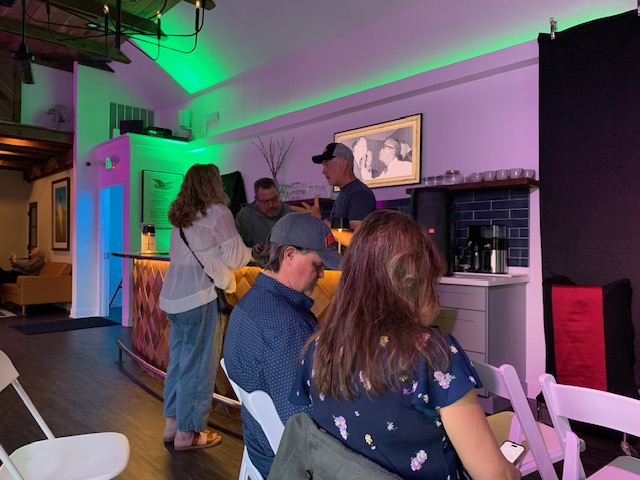
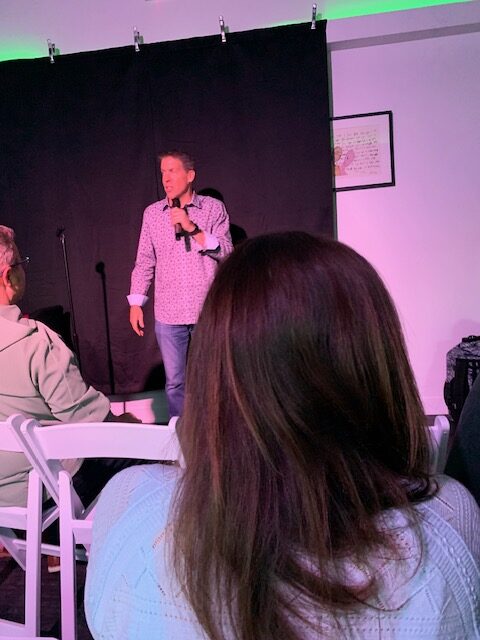
Perennial host comic Tim Conniff kicked things off: “These are the Yardley people who don’t have shore homes.” The money joke got an easy laugh in this relaxed setting. The Jersey Shore, a summer getaway tradition for many, is about 90 minutes away from this idyllic Exurb of Philadelphia along the Delaware River. (Yardley is about 10 minutes downriver from Gen. George Washington’s Christmas night crossing in 1776.) Conniff pointed to the vacant front row, ribbing that he now understands how his priest feels on Sunday mornings. Some clapped when he asked who the fellow Catholics were in the room. Scanning the white faces, Conniff remarked, “I got to be honest with you, though, not the most diverse crowd I’ve ever seen.”
His generational teasing engaged the audience. When asking who in the room identified as Boomers, Gen X, Millennials, and Gen Z, it was clear Gen X was well-represented. He noted the differences that marked the cohorts. Young people know their pronouns. Older generations used AOL email. People cheered when Conniff called out the Hotmail domain. He played up how Gen Z came on the scene: “This is the generation best known for eating Tide Pods, right?” Only a couple of Millennials were in the audience, including me. Conniff’s quip: “Is your Xbox broken?” Then, he brought up a birthday party on Philadelphia’s Main Line with 50 attendees: “28 Millennials and 22 free-range Millennial offspring.” “Ahhhs” sounded all around.
Taking the stage next was comedy-magician Norman Klar, the first comedian to perform at the National Constitution Center in Philadelphia. Early in his act, he jested: “I just had a birthday. I turned 63…about 10 years ago.” After earning a hardy laugh, Klar moved on to his happily married status, which other longtime couples related to. He and his wife of 35 years watch “Jeopardy!” together. “She gets every answer right.” Meanwhile, the only one he knows is: “What am I watching now?” The two vacation in Cape May, New Jersey, her preferred destination over his nearby Wildwood. “We compromise,” he kidded, then brought up the inflationary prices on the promenade. Pizza costs $12.50, a slice. When the audience chuckled, he stressed, “That’s a good deal there.” Boisterous laughing ensued. The crowd roared when he made a racy joke that involved bringing home roses for his wife after nearly forgetting her birthday!
Klar mentioned his hands shaking, then quipped, “I have to be careful when I eat.” Nonetheless, he nimbly played with a giant deck of cards and kept the rapt audience involved in a series of card tricks, offering participants cards to choose, then guessing their selections. He impressed by picking the right cards out of the deck or improvising a clever cover.
As Klar squeezed in an animal act, he said these creatures are found in South Africa, “where they’re killing all those people,” seeming to slyly reference the recent confrontation in the White House about what was really happening in South Africa. It was the closest to politics we came.
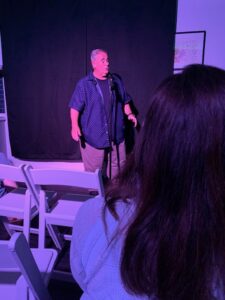
Headliner and local comic David Graham said the audience looked like “a Hallmark movie crowd.” After watching several of these films, Graham felt he could write one himself. “It’s the same story every time. The corporate lawyer comes to town. She’s going to buy the candle shop from this guy…. They always walk through the mistletoe and her heart melts,” he said. Notably, Hallmark Channel Christmas movies are more popular than average in America’s 196 Exurbs like Bucks County, according to the 2024 MRI-Simmons consumer survey.
Graham went on about how controlling a Fitbit can be, besting a bad Jersey driver on I-95, and joining his wife on weekend girls’ trips to Vegas to people-watch. About his wife of many years he playfully joked, “We still get each other; we don’t understand each other.” Some winding stories Graham shared about his connections and couple dynamics were on the raunchier side — but got a lot of laughs in the room. Graham closed out the show to hoots, claps, even whistles.
After wrapping, friends and regular comedy-goers Denise Kilian and Carrie Foraker said they had a good time. They liked Klar’s performance the most, especially the interactivity. Foraker encouraged her friend to come along this time after a tough week. The generational jokes landed well because “they’re true,” said Kilian from nearby Levittown who owns an outdoor living supply business with her husband in Princeton, New Jersey. She said she may see another show here. Her friend, Foraker of Langhorne, Pennsylvania, enjoys a range of humor. “I’m pretty open-minded. Left, right, that’s why we live in the United States of America, right?”
 Ari Pinkus is senior editor/writer/researcher and project manager at the American Communities Project.
Ari Pinkus is senior editor/writer/researcher and project manager at the American Communities Project.
 Jenna Modica is a production assistant and freelance writer in Los Angeles with experience across indie films and large-scale production.
Jenna Modica is a production assistant and freelance writer in Los Angeles with experience across indie films and large-scale production.
 Sarah Murphy is a recent Albuquerque, New Mexico, transplant who enjoys writing about the intersection of people, place, and community.
Sarah Murphy is a recent Albuquerque, New Mexico, transplant who enjoys writing about the intersection of people, place, and community.

Jenna Fisher is a veteran journalist, educator, and doctoral student in journalism with more than 15 years of experience reporting for outlets including The Christian Science Monitor, The New York Times, and Swimmer Magazine. Her research and teaching focus on media and news literacy, preparing people to engage critically and constructively with today’s complex media landscape.

Jake Pinkus is a freelance digital producer and founder of Pinkus Partners in the Chicago suburbs.
 Kathleen Majorsky is a professional freelance writer with more than 15 years of experience in email marketing, journalism, and newsletter creation.
Kathleen Majorsky is a professional freelance writer with more than 15 years of experience in email marketing, journalism, and newsletter creation.

